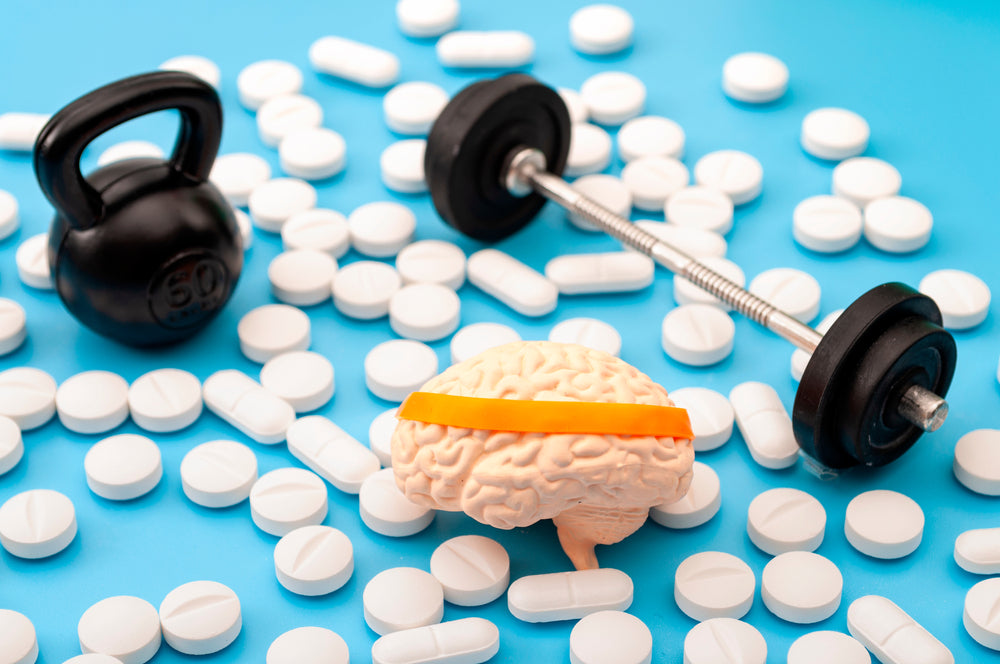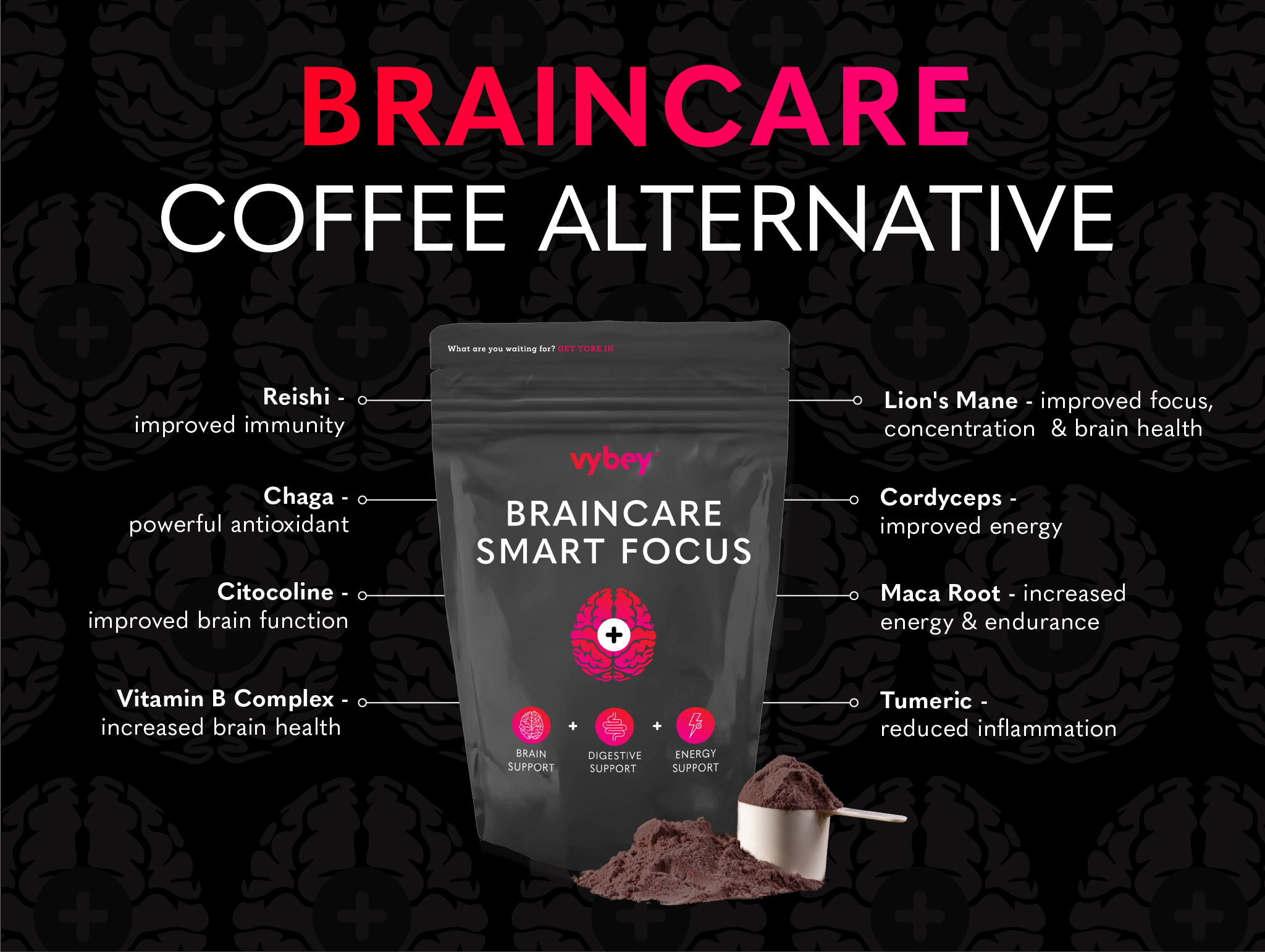Nootropics are medicines and dietary supplements that protect the brain from stress and improve focus, concentration, memory, and learning.
Cognitive enhancers like nootropics are nothing new, but the study of natural nootropics to create dietary supplements is relatively recent, leading to products like vybey Lion's Mane and our nootropic coffee alternative Braincare Smart Focus as a safe and easy way to try its benefits.
A Quick History
The name "nootropic" was coined by Romanian psychologist and chemist Corneliu E. Giurgea in 1972, derived from the Greek words "nous" (mind) and "tropein" (to bend or turn) during clinical trials of the synthetic drug piracetam.
However, the medicinal use of nootropics goes way further than 1972, with lion's mane documented as useful Yin and Yang regulators around 200 AD in the famous Chinese works "Shen Nong Ben Cao Jing".
Nootropic - Drug or Supplement?

The nootropics you can get are synthetic or natural, with synthetic types available on prescription and as over-the-counter medicines.
But not all nootropics are drugs – although they can be drugs, they can also be natural products. Here are some examples of natural nootropics:
- Lion's mane - an edible mushroom available in raw or supplement form as a fruiting body extract. Found in our Braincare Smart Focus, Complete Meal Powder or our Lion’s Mane.
- Caffeine - found in tea, coffee, and chocolate and as an additive to some beverages and foods
- L-theanine- best combined with caffeine for added focus, l-theanine is found primarily in tea leaves and promotes relaxation and focus without the jitters that come with caffeine.
- Cordyceps- improves energy levels and endurance, which can indirectly support cognitive function.
- Turmeric - an aromatic powder from the ginger family, native to the Indian subcontinent and Southeast Asia.
The line between 'drug' and 'supplement' is easy to cross when something's prescribed; however, with nootropics, it's inaccurate to classify them as one or the other. Would you think of coffee as a drug? Probably not.
Types of Nootropics
- Dietary supplements like lion's mane mushroom, Bacopa monnieri, and omega-3 fatty acids fall into this category.
- Synthetic compounds are lab-created substances designed to target specific cognitive processes.
- Prescription drugs developed for treating cognitive disorders like ADHD, Alzheimer's, or narcolepsy are sometimes used off-label as nootropics. Examples include Adderall, Ritalin, and Provigil.
Lion's mane
Lion's mane is a natural nootropic popular in Traditional Chinese Medicine (TCM) as an energy regulator.
A recent study [1] found that a single 1.8g dose of lion's mane may improve the speed of performance on the Stroop task, indicating the potential benefits for short-term attention and executive function. Additionally, 28 days of supplementation showed a trend towards reducing subjective stress.
Lion's mane contains bioactive compounds like hericenones and erinacines, which can cross the blood-brain barrier, promote nerve growth factor synthesis, and exert neuroprotective and anti-inflammatory effects in the brain.
This pilot study points to the promising cognitive and mood-enhancing potential of lion's mane supplementation in healthy populations, although the small sample size is a limitation, and more extensive trials are needed to confirm these effects.
Raw or Supplement
You can eat raw or cooked lion's mane mushrooms, although it has greater effects on the brain as an extract. Lion's Mane Mushroom Fruiting Body Extract 10:1 is the gold standard for supplements made from 10 parts mushroom.
The processing steps vary by supplier to preserve specific compounds in the shroom, so all extracts are unique.
vybey Lion's Mane is a 100% natural, vegan supplement available as a powder for mixing into food and drink or as a capsule made from natural cellulose HPMC (wood & water).
It contains an excellent nutritional profile suitable for dieting with 32.2g of fibre, 79.2g of carbs (5.3g natural sugars), and 7.4g of protein per 100g. No heavy metals or additives are present in the powder – it is completely pure.
Our Braincare Smart Focus is an excellent alternative to coffee, offering sustained energy and mental clarity without the typical caffeine jitters or crashes.With just 27.1 calories per 8g serve, enjoy premium ingredients like lion’s mane, reishi mushroom, chaga and cordyceps.
Mechanisms of Action
So, nootropics enhance brain function. But how?
Many nootropics rev up the brain's metabolism [2] - they increase the production of vital lipids that make up cell membranes, ramp up energy production, and get more glucose into brain cells to fuel them.
Some nootropics fine-tune the communication between neurons by modulating neurotransmitters like acetylcholine, glutamate, GABA, dopamine, and serotonin, while others shield the brain from harm, acting as antioxidants to neutralise dangerous free radicals and help the brain withstand low oxygen conditions and toxins.
Certain nootropics boost blood flow to the brain, ensuring it gets the oxygen and nutrients it needs to thrive. On a microscopic level, some of these compounds can tweak which genes get turned on or off, boosting the production of helpful growth factors.
Excitingly, scientists have recently discovered that certain nootropics can even stimulate the birth of new mitochondria - the cell's powerhouses - and get rid of old, faulty mitochondria in brain cells. This may be one of the keys to maintaining youthful brain function and defending against age-related cognitive decline.
All in all, nootropics' multi-pronged mechanisms allow them to enhance the brain's health and performance from many different angles, which may be why they can have such powerful effects.
In summary, nootropics work by:
- Increasing blood flow and oxygenation to the brain.
- Providing precursors for neurotransmitter synthesis.
- Stimulating the growth of new neurons (neurogenesis) and synapses.
- Modulating neurotransmitter systems like dopamine and serotonin.
- Protecting neurons from oxidative stress and inflammation.
- Improving cellular energy production in the brain.
What Science Says

A systematic review [3] of plant-derived nootropics shows they can positively impact various aspects of human cognition and brain function.
The review examined six neurocognitive domains: perceptual-motor functions, language, learning and memory, social cognition, complex attention, and executive functions.
It found that caffeine was the most potent PDN for boosting attention and executive function-related cognition in the short term. Ginkgo biloba improved perceptual-motor functions in individuals with disease-related impairments.
Ashwagandha was the best PDN for social cognition, significantly reducing anxiety-related physiological and behavioural markers.
There might be positive synergistic effects from taking multiple natural nootropics, although no studies have examined these combinations and may increase the risk of side effects, so for now, it’s best to stick to one nootropic.
Conclusion
Nootropics are natural or synthetic substances that enhance cognitive functions like memory, creativity, motivation, and attention – you experience this whenever you drink coffee through the nootropic caffeine.
Research shows that nootropics optimise neurotransmitter levels, increase blood flow to the brain, and protect brain cells from damage, although these effects vary, and it's inaccurate to say every nootropic can improve brain health.
Lion's mane mushroom is currently the most promising natural candidate because clinical trials have shown cognitive-enhancing effects in humans and animals. Scientists have noticed, and research is ongoing into its effectiveness.
Lastly, a quick word on safety – natural nootropics change the way the brain behaves, but not every nootropic has positive effects. You should do your research before trying them and consult an expert if you have medical conditions.

Back to vybey blogs